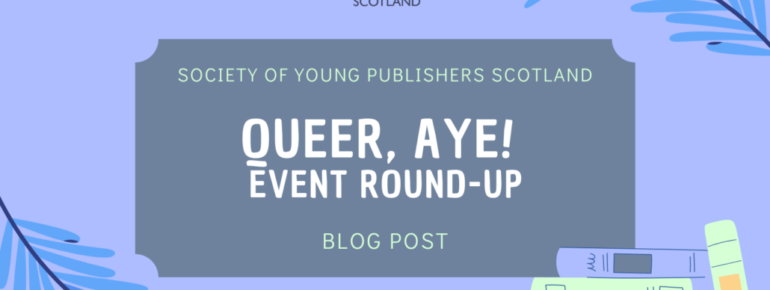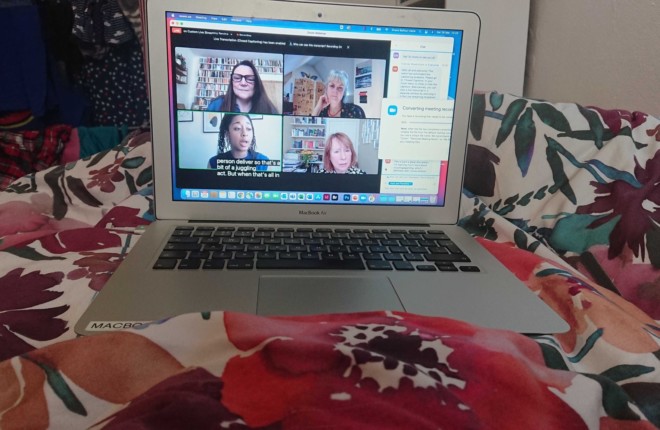
Queer, Aye! LGBTQIA+ Publishing in Scotland – Event Round-up
Posted on May 30, 2021 in Scotland

The May 2021 event for the SYP Scotland was Queer, Aye! LGBTQIA+ Publishing in Scotland, in which we spotlighted LGBTQIA+ writers & some Scottish indies that are producing great titles with them. Our panel discussed queer publishing in Scotland, challenges faced by LGBTQIA+ writers, poets & performers, and how we, the future of the industry, can improve things.
__________________________________________
The panellists taking part in this discussion were:
Esraa Husain – CHAIR
Esraa is a writer & academic from Kuwait. Esraa is working on a PhD in Black Scottish writing, migrancy, political agency & postcolonial theory at Glasgow University. They are the founder of UBelongGlasgow, a community platform featuring BPOC, LGBT+ & disabled creatives.
Andrés N. Ordorica (he/him)
Andrés N. Ordorica is a queer Latinx poet & writer. Publishing credits include The Skinny, Bella Caledonia, The Acentos Review, Somewhere: For Us, 404 Ink Magazine, & Gutter, amongst others. In 2020, he was awarded a Second Life grant through the Edwin Morgan Trust.
Thomas Anderson-Thatcher (he/him)
Thomas Anderson Thatcher is the co-founder and co-editor of @Somewhere_ForUs, the quarterly LGBTQ+ arts, culture, heritage and enterprise magazine for #Scotland and beyond. Launched in Nov 2020, they’ll shortly be publishing their third issue.
Gray Crosbie (they/them)
Gray Crosbie is a queer poet who performs regularly at poetry events & cabaret nights. Their writing has been published in anthologies, literary magazines, and as poetry films on BBC The Social. Their pamphlet of flash-fiction, Love, Pan-Fried, was published in 2019.
Beth Cochrane (she/her)
Beth Cochrane is a writer, Events & Learning Coordinator at the National Library of Scotland, and Commissioning Editor of poetry press, Stewed Rhubarb. She was a recipient of a 2018 New Writers Award and is a Cove Park Emerging Writer in Residence 2021.
__________________________________________________
The discussion began with Esraa asking the panellists to talk about their experiences working in the queer literary scene. Andrés commented that there is a do-it-yourself spirit in Scotland that can be very welcoming. One of the reasons for this is that Scotland is small – London is twice or three times the size of Scotland as a whole and there is less of a competitive spirit in Scotland. While you might not know everyone personally, you know people from the scene. Andrés gave examples saying he had seen Grey at an event and he loved their spoken word, and has seen Beth at the Scottish Poetry Library – there is a sense of genuine community.
Thomas gave his experience from the magazine perspective and said that as Scotland’s newest LGBTQ+ magazine they have to thank all the others that came before them. He mentioned the magazine ‘Gay Scotland’ which was founded in 1971, and said there are not many other magazines specifically showcasing the LGBTQ+ community nowadays. When they were deciding on their magazine, there wasn’t anything making a splash in the way Scotland’s LGBTQ community deserves, which was one of the big motivators when getting started.
Gray made the point that the queer spoken word scene is mostly awesome especially in Glasgow and Edinburgh, although they have had less positive experiences in other parts of Scotland. They gave the example of one event which questioned their use of the identifier ‘queer’ and have not been as progressive as the major cities, but also acknowledged that this was a learning opportunity for that venue and a chance for them to become more inclusive through these conversations. Gray said they have met most of their trans friends through spoken word events, and they use poetry almost as therapy so having a chance to learn other people’s experience is helpful. They said the spoken word scene was particularly helpful around five years ago when they were figuring out their gender. Gray pointed out that many spoken word nights make a lot of effort to be as inclusive as possible and said that Loud Poets is particularly inclusive, ensuring that they don’t have an all white line-up, at least one person is LGBTQ+, and there is gender balance.
Beth discussed her experiences in the LGBTQ+ community by clarifying she is heterosexual but aims to amplify queer voices through her work, and is a commissioning editor at Stewed Rhubarb, which is predominantly a spoken word publisher. It was founded around ten years ago when James Harding and Rachel McCrum wanted more poetry about radical and personal experiences being published. Before Beth joined Stewed Rhubarb, she was events manager at the Scottish Poetry Library where they hosted lots of Stewed Rhubarb launches, and through her career she has focused on promoting queer voices and making Scotland more welcoming to queer people, whether that be through events or publishing.
Esraa lead on from this to ask more about the spoken word scene and what role this plays. Gray emphasised the role of community in the spoken word scene and said that the inclusivity of these physical spaces where spoken words events are hosted is one of the things they have missed most through the pandemic. There have been chances to do online events and they have appreciated every performance opportunity, acknowledging that online events are more accessible and people outwith Scotland can attend, but you lose that social community side of it. It is not as easily to socialize in an online space and get that community experience that comes with spoken word. Esraa added that there is some awkwardness with online events, and it is unnatural sharing a space with 50 people, and when the event ends you are suddenly alone again. Beth gave a shout out to Lighthouse Books who host Inky Fingers and is always a warm, welcoming space, and an opportunity to try out your work in a nurturing environment. She said she is looking forward to open mics opening back up where you have a safe space to hone your poetry and also practice performance.
Esraa moved the conversation on from events to publishing, asking how indie publishers make space for queer writers in comparison to larger publishers. Andrés said he has been welcomed into spaces by We Were Always Here, 404Ink, Tapsalteerie and Gutter for example. Good things are happening in the indie scene and he has found favourite writers through indie publishers. Thomas contributed that Somewhere For Us wanted to be a space on the pages of a magazine for LGBTQ+ writers and allies, and wanted to be genuinely diverse. He points out that magazine publications are not always diverse often due to commercial pressures to have a cover that is going to sell the magazine. Somewhere For Us have tackled this issue by having illustrative covers have as much representation as possible, and are not just diverse in terms of people but also in surroundings, wanting to display different environments on the cover. Another element that is important is giving back to contributors – the magazine is volunteer led but Thomas remarks that exposure does not pay the bills! Esraa asked the panellists to expand more on the process of a work they have been involved in, and Andrés discusses his time working for the Scottish BAME Writers Network, where they commissioned five QTBIPOC (Queer, Trans, Black, Indigenous, People of Colour) to write for LGBT History Month, and chose people who would not always be represented.
Gray followed on from this by discussing one of their biggest projects, a full length spoken word show called Amphibious. Their only chance to perform it was at Edinburgh Fringe in 2019, after having worked on for a while pulling together lots of poems. It’s a modern day fairy tale about mer-people who have a very different gender system, which is used as a way to talk about non-binary genders. Gray said they had performed it at different poetry nights and cabaret nights that are often queer inclusive spaces, so putting it to a wider population at the Fringe was a different experience as you don’t know who will turn up. It made them appreciate the spoken word scene more and how safe they feel within it, saying that although the reception was largely positive at the Fringe, not everyone is as welcoming. Beth said that Stewed Rhubarb got involved in something very exciting last year when Dr. Éadaoín Lynch approached them to say they wanted to create an anthology of queer writers. Together with Alycia Pirmohamed, they made an application to Creative Scotland Open Fund which was successful, and they have had lots of discussions about how to create a community and support the writers who will be taking part. Beth said it is still early in the process but this is the most exciting project she has worked on as commissioning editor. Esraa added that it is great how dedicated to political issues Stewed Rhubarb is and how willing they are to publish political voices.
Looking ahead to the future, Esraa asked how can we improve this scene and how can we do better for the publishers of tomorrow. Thomas says that it is most important to listen to feedback and never stand still. He acknowledges that he is a white man with privilege and it is crucial that he needs to listen in order to best represent the community in the magazine. He wants the magazine to be a source of uplifting queer joy and a source of escapism without shying away from the important stuff.
Moving on to audience questions, the first questions is how to get into the spoken word scene and how to get published. Gray offers the advice to go along to lots of open mic nights, for example Inn Deep in Glasgow and Inky Fingers in Edinburgh, as well as Category Is Books which has an open mic night. They are mostly very inclusive and friendly. Beth discusses publishing spoken word, saying that while there is a lot of great spoken word and not many people publishing it as pamphlets or collections. There is Stewed Rhubarb in Scotland, and in England there is Verve and Outspoken, and generally there are more options in England. She says there is not really a trick to it but you have to be great at your craft. Esraa adds that rejection is part of the process and not a reflection on you, so you can take your work to the next place and keep trying.
Lastly, Esraa asks the panellists to share something happening in the queer indie scene that’s exciting. Andrés mentions that he is very excited for the Stewed Rhubarb anthology, and loves anthologies as a form because it’s a great way for new writers to get their work out there. Arkbound which is based between Bristol and Glasgow are publishing an LGBTQ+ anthology this summer which he is featured in. He also said that there should be more individual people to have collections published as there are so many queer writers who are amassing bodies of work, like Gray, who need to be celebrated, and indie publishers based in Scotland need to lead the charge with that. Thomas talks about an exciting element of his job being the surprise at what the writers come up with and how they each interpret the theme. Beth discusses how she navigates the commissioning process as a straight person, and says that the most important thing is to involve people from the queer community at every stage, and quotes the brilliant writer Ever Dundas who says ‘nothing about us without us’ which is a mantra to live by when commissioning writers.
This brings us to the end of the Queer, Aye! event which was a brilliant insight into queer writing and publishing in Scotland. A huge thank you to our panellists who offered such a wide range of experience and knowledge about queer publishing. Remember to follow us on social media for details of our upcoming events!



 Listen to the podcast
Listen to the podcast  Explore the Youtube channel
Explore the Youtube channel